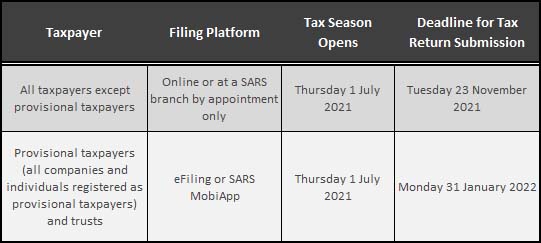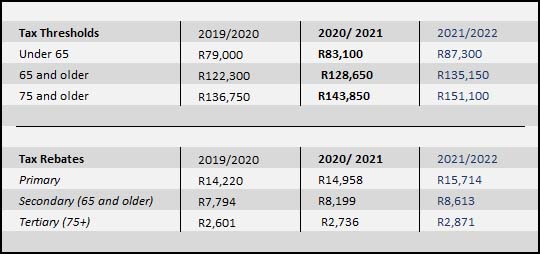SMME Tax Relief measures for 2021

Background to the emergency tax relief measures
On 25 July 2021, President Ramaphosa announced emergency tax measures. This was in response to the continuing COVID-19 pandemic and recent unrest in the country that resulted in the destruction of businesses. Further details of the proposed measures were provided by the Minister of Finance and National Treasury on 28 July 2021. This is an overview of the relief measures applicable to Small, Micro, and Medium Enterprise (SMMEs).
Do you qualify for the emergency tax measures?
In order to qualify for the emergency tax measures, you must be tax compliant, which means that you:
- Are registered for all required taxes
- Have no outstanding returns for any taxes you are registered for
- Have no outstanding debt for any taxes you are registered for, excluding:
- Instalment payment arrangements
- Compromise of tax debt
- Payment of tax, pending objection or appeal.
You can view your tax compliance status via eFiling under your “My Compliance Profile”, or request your latest Statement of Account for the taxes you are registered for.
What are the tax relief measures?
The announced measures are:
- The introduction of a tax subsidy of up to R750 per month for the next four months for private sector employers who have employees earning below R6500. This subsidy will be provided under the current Employment Tax Incentive.
- Tax compliant businesses with a gross income of up to R100 million will be allowed to delay 35% of their Pay-As-You-Earn (PAYE) liabilities over the next three months, without penalties or interest.
- Tax compliant businesses in the alcohol sector can apply to the SARS for deferrals of up to three months for excise duty payments. Please note that this can only be done after the circumstances are set out to justify the deferral.
What is the period for the relief?
Below are the different periods for the three types of relief:
- Employment Tax Incentive (ETI)
- PAYE Deferrals
- Pause on Excise payments for alcohol
Employment Tax Incentive (ETI) tax relief period
Tax relief under the ETI is available for a four-month period from 1 August 2021 to 30 November 2021. The first extended ETI can be claimed in your August EMP201. Please remember that this is due by 07 September 2021. The maximum monthly amount that will be permissible under the ETI during this period will be increased according to the following criteria:
- For employees who are eligible under the current ETI Act, the amount increases from R1 000 to R1 750 per month in the first qualifying 12 months, and from R500 to R1 250 per month in the second 12 qualifying months.
- A monthly ETI claim of R750 will be allowed for employees who are between 18 and 29 years old, and are no longer eligible for the ETI due to the employer having claimed it for them for 24 months, or who were in the employer’s employ before 1 October 2013.
- A monthly ETI claim of R750 will be allowed for employees who are between 30 and 65 years old, and are no longer eligible for the ETI due to their age.
SARS will also pay monthly ETI refunds for the four-month period, instead of every six months as is normally the case.
To claim tax relief under the ETI:
- Capture the full PAYE Liability (The form will calculate the PAYE payable at 100%, you cannot change this value)
- Capture the ETI Calculated
- Calculate 65% of the PAYE Liability in terms of the tax relief for PAYE for the first three months
- Limit the ETI Utilised to the lesser of ETI Calculated or 65% of the PAYE Liability for the first three (3) months or 100% of the PAYE liability in the 4th month
- Calculate the Total Payable as (65% of the PAYE Liability for the first three months, or 100% plus the first payment of the deferred amount in the 4th month less ETI utilised plus SDL Payable plus UIF Payable.
Note:
- If your payment is made late, you will forfeit the benefit of the emergency tax relief for PAYE and SARS will impose penalties and interest on the calculated Total Payable
- Check your Statement of Account after 48 hours of submitting the EMP201 to make sure that SARS has not revoked the discount due to non-compliance.
PAYE tax relief period
The tax relief for PAYE is available to qualifying businesses for the three month period from 1 August 2021 to 31 October 2021. The first deferment can be claimed in your August 2021 EMP201 return, which is due by 07 September 2021.
To claim tax relief for PAYE:
- Complete the EMP201 as per normal with the full PAYE Liability (the form will calculate the PAYE payable at 100%, you cannot change this value)
- Calculate the Total Payable as 65% of the PAYE Liability plus SDL Payable plus UIF Payable.
Note:
- SARS will issue a Statement of Account, reflecting the tax relief (deferred amount) for PAYE and the total amount payable for that respective period
- If your payment is made late, you will forfeit the benefit of the tax relief for PAYE and SARS will impose penalties and interest on the calculated Total Payable.
PAYE deferral months:
| For period | File in | |
| August 2021 | September 2021 | * month 1 of relief |
| September 2021 | October 2021 | * month 2 of relief |
| October 2021 | November 2021 | * month 3 of relief |
Payment of the deferred PAYE liability
After the 7th of November 2021, SARS will determine the four equal payments for the total amount that you have deferred and include it in your monthly Statement of Account. Payments will be made over a four month period that will commence on 07 December 2021 with the last payment due by 07 March 2022.
Alcohol industry: Payment Deferral of Excise Duty Payments on Alcohol
Due to the restrictions on the domestic sale of alcoholic beverages, tax compliant businesses in the alcohol sector can apply to SARS to obtain deferrals of up to three months for excise duty payments. Please note that this can only be done after the circumstances are set out to justify the deferral.
This is expected to help a significant number of businesses that are under pressure in terms of cash flow and their ability to honour payments to SARS.
The payment deferments will be in accordance with provisions of the Customs and Excise Act which allows excise traders to request for deferrals of duties as per conditions in section 105 of the Act.
How do I apply for the Excise deferral?
Applications can be sent to the following email address OSC@sars.gov.za.









